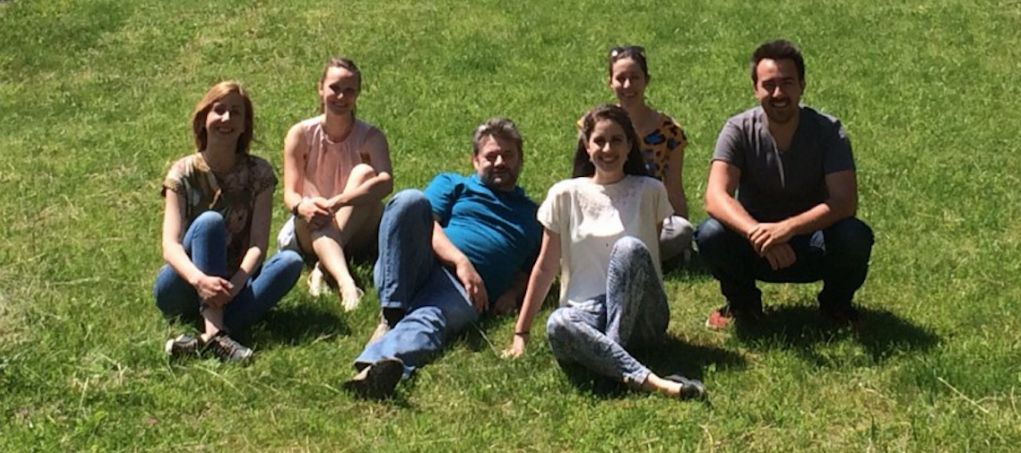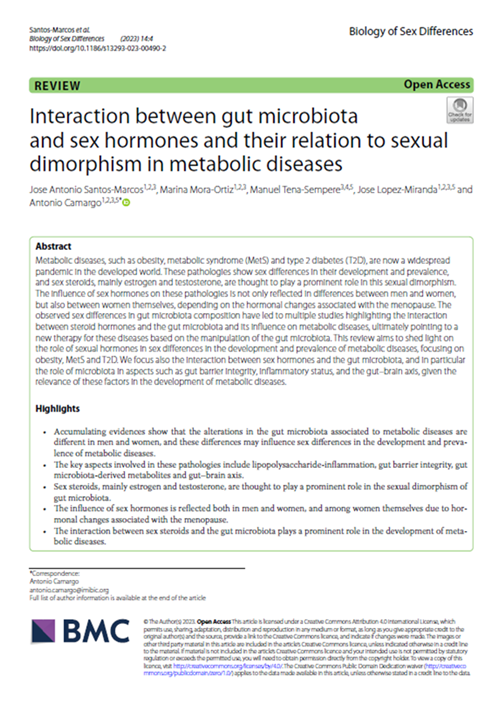 Marina Mora Ortiz (PhD) develops her research project within the group GC09 Nutrigenomics – Metabolic Syndrome, under the supervision of Prof. José López-Miranda. Her project is titled MEMOIR – MEtagenomic Modelling of cOgnitive ImpaiRment. It aims to determine the effect of diet and/or a probiotic treatment on the gut-microbiota and its association with Mild Cognitive Impairment. Marina’s project will last from February 2021 till January 2024.
Marina Mora Ortiz (PhD) develops her research project within the group GC09 Nutrigenomics – Metabolic Syndrome, under the supervision of Prof. José López-Miranda. Her project is titled MEMOIR – MEtagenomic Modelling of cOgnitive ImpaiRment. It aims to determine the effect of diet and/or a probiotic treatment on the gut-microbiota and its association with Mild Cognitive Impairment. Marina’s project will last from February 2021 till January 2024.
Mild Cognitive Impairment (MCI) is a syndrome that encompasses decline in some mental abilities including memory, perception and language domains. It has been hypothesised that the syndrome may be triggered by intestinal dysfunction. In fact, the microbial-gut-brain axis, a feedback mechanism between the gut microbiota and the central nervous system, has been previously associated with senescence and neuropsychiatric diseases. Our project aims to determine the effect of diet and/or a probiotic treatment on the gut-microbiota and its association with MCI. Existing faecal samples (from 50 individuals over age 65) available at IMIBIC, will be used to define gut microbiota genes linked to MCI.
The high-throughput analysis of genetic material from the gut microbiota, i.e. gut microbiota shotgun metagenomics, will be employed to sequence existing faecal material available at IMIBIC. Statistical modelling, e.g. Linear Mixed Effect Models (LMEM), Orthogonal Projection on the Latent Structure Discriminant Analysis (O-PLS DA) and Permanova amongst others, will be used to address the three main objectives of these study, which are: i) to identify the effects of a probiotic treatment on the MCI, ii) to determine the effect of the dietary intervention (Mediterranean diet) on the cognitive state of the individuals and finally, iii) to investigate any sex association to the interventions. The project will also involve training in shotgun metagenomics and bioinformatics. The final outcome could elucidate if dietary interventions and probiotics can palliate MCI.
The aim of this project is to study the association between gut metagenome and MCI and its effect on deleterious changes in human cognition. The project also aims to investigate potential mechanisms to revert MCI, through the use of dietary intervention and probiotic treatments. This will provide evidence of the direction of causation and identify microbial targets for human clinical interventions to reduce MCI during ageing. Our hypothesis is that MCI-associated gut metagenome negatively affects the gut-brain-axis and consequently human mental health.
Objective 1 is to identify gut microbiota genes associated with MCI. Shotgun metagenomics analyses will be carried out in stool samples from an existing cohort (n=50) available at the host group by sequencing in an Illumina MiSeq platform. Using both, Linear Mixed Effect Models (LMEM) and Orthogonal Projection on the Latent Structure Discriminant Analysis (O-PLS DA), we would identify genes associated with MCI in the cohort.
Objective 2 is to test the effects of the combined intervention of a Mediterranean diet (it will contain 35-38% of calories in the form of fat (22% monounsaturated fat, 6% polyunsaturated fat, 7% saturated fat), 15% protein and 50% carbohydrates) and a probiotic with 109 CFU of Lactobacillus rhamnosus and Bifidobacterium longum (Biopolis-MIX42 capsules) in the modulation of gut metagenome in association with MCI.
Objective 3 aims to analyse the relationship between gut metagenome, the factors discussed in Obj. 1 and Obj. 2, and sex. This would enable a personalised clinical approach towards MCI clinical treatment strategies and further study designs.
European Researchers Night 2021 - Diabetes, Metabolic syndrome and Gut microbiota. Video summary (in Spanish)
Nomad Scientists
I was invited to give a talk about my scientific career at the ENABLE Satellite event, organised at IMIBIC in May 2021. I gave my presentation the title “Nomad Scientists” because I consider mobility, as well as flexibility, as keys to progress in my scientific career.
Doctoral studies abroad?
In 2011 after finishing my master’s degree the consequences of the economic crisis had hit hard in Spain and doctoral fellowships were paused for an indeterminate period. It was not in my plans to go abroad for my doctoral studies, but I had to adapt to the situation.
I browsed through offers at EU’s EURAXESS portal to find opportunities to continue my studies in other countries. I found it very difficult to compete with the nationals, not only because of my language skills but also because of the need to validate my degree in a foreign country. I felt I was losing my time and cannot even remember how many CVs I sent.
Marie Curie Fellowship in Cambridge
Finally, I decided to focus on the Marie Curie Innovative Training Network (MSCA ITN), now called MSCA Doctoral Networks. Their objective is to train early-stage researchers from different countries. There were not many options available, but I was lucky enough to get an invitation to two interviews. In one of the selection processes, I was in the second position and in the other one selected.
The Marie Curie Fellowship brought me to Cambridge to carry out my doctoral studies within the European ITN programme LegumePlus. The network offered me possibilities to travel to the countries of the different network partners and collaborators to take courses to learn new techniques and soft skills.
The network focused on agricultural research, whereas I had studied veterinary science and had a master’s degree in the science and technology of meat. Thus, my doctoral studies were not exactly in the topic I would have wanted, but given the lack of opportunities at that time, I had to be flexible.
PhD Studies and Postdocs in the UK
In the UK, doctoral studies last only 3 years, making it challenging to pull out your PhD thesis on time. I met many researchers who had worked over a year without any funding to finalize their thesis, and counting on their savings. This is very difficult in an expensive country such as the UK.
Luckily, it is possible to start working as a postdoc even before finishing the PhD studies. I opted for this and during a couple of months combined my PhD work with postdoctoral work. The most common path is to obtain a position as Post-doc Research Associate or Post-doc Research Assistant hired within a research project.
The Post-doc Research Associate is the better option of these two, as it is a more senior position and with a higher salary. It is relatively easy to find this type of opportunities in the UK via the web https://www.jobs.ac.uk.
After finishing my PhD I worked as a post-doc Research Associate at the University of Reading for 3 years, and at Kings College for 2 years and a half. These years offered me the opportunity to finally work on biomedicine. During my postdoc, I learned different omics techniques, which is a fast-growing area.
The average postdoctoral phase in the UK lasts for 7 years, and it is not recommended to stretch this phase, as obtaining consecutive postdoctoral contracts becomes very difficult.
What comes after postdoc?
After your years of postdoc, there are generally 2 main options; to continue in academia as a Lecturer (as they call university professors), or make a shift to industry.
A Lecturer contract is permanent but subject to conditions, such as obtaining funding for research, and thus for the university that hires you. To get a position as a Lecturer, it is convenient to have at least one Fellowship in your CV, as it is a good way to demonstrate your capacity to obtain funding and your chances to be invited to an interview increase.
I applied for two fellowships, one in London and another one – a MSCA Cofund fellowship - in Córdoba, where I currently work.
What’s good and what’s not so good
In my opinion, the biggest disadvantage of a scientific career, both in Spain as in the UK, is that despite being highly valued by society, it does not offer very good conditions or salaries. The contracts tend to be short (from 1 to 3 years) and salaries low. The advantage is the vocational nature of the work and the chance to enjoy your daily tasks.
My message to young people interested in a scientific career is to go for it and try. There’s always time to change the direction and reinventing yourself professionally is not a bad thing at all.

Dissemination activities
New Research Article
Interaction between gut microbiota and sex hormones and their relation to sexual dimorphism in metabolic diseases


